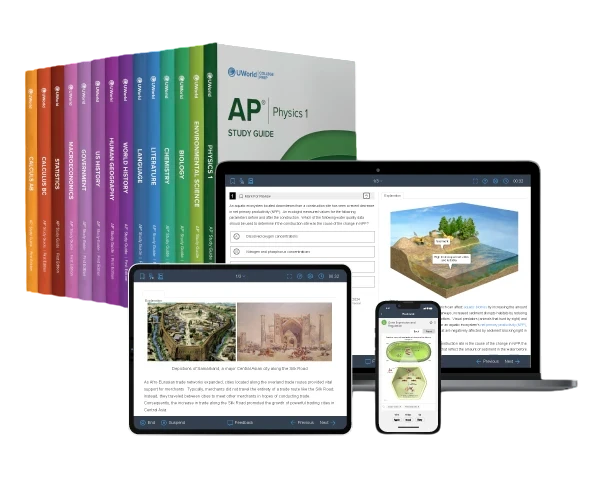College Board® is very strict about protecting the integrity of the Advanced Placement® (AP®) program and has stated that examinees are prohibited from sharing or accessing any type of unauthorized information during exams. Therefore, College Board has implemented specific AP exam policies regarding calculators and equipment, exam security, breaks during exams, and accommodations to promote a fair testing experience for all students.
What Should I Bring on AP Exam Day?
Curious about what you can bring into the exam room? Look no further! Per the current AP exam guidelines, here’s a checklist of items you can bring on test day1.
- Testing device: Fully charged Mac or Windows device, Chromebook, or iPad
- No. 2 pencils with erasers (Hard and black (HB) pencils are also acceptable for students outside of the United States.)
- Pens in black or dark blue ink
- School photo ID or current government ID if you do not attend the school where you are taking the exam
- College Board Services for Students with Disabilities (SSD) student accommodations letter (if applicable)
- An approved calculator, if required for the exam, and a ruler or straightedge, if you are taking an AP Physics Exam
- A watch without internet
Note: If you’re testing outside the United States, check with your school administration for any required documentation. International or homeschooled students should contact College Board for guidance before exam day.
Items You Should Not Carry into the Exam Room:
To avoid issues on exam day, before you arrive, ensure you’re clear on the following items not allowed in the testing room:
- Backpacks or bags
- Cell phones or electronic communication devices of any kind (digital testing devices are exceptions)
- Earplugs, highlighters, correction fluid, pencils that are not No. 2, or pens that are not blue or black ink
- Scratch paper (If your exam requires scratch paper, you will be provided with it during the exam.)
- Books, notes, mechanical pencils, dictionaries, and clipboards
- Any subject-related information on your clothing, shoes, or body
- Food or drink items
Things to Remember about the AP Exams
Here are a few things to know if you are planning to take the AP exams:
1. Exam Location and Application
- The AP exam is administered in a test center, typically your high school, using the BluebookTM application.
- You must download the application to your testing device unless your school has already installed it.
2. Privacy and App Access
- Before accessing the application, you must agree to the privacy policy and the use of this app.
3. Exam Day
- Follow instructions from the Bluebook application and your AP exam proctor.
- Connect your testing device to the test center’s Wi-Fi and complete the required check-in process.
- Agree to the terms and conditions within the application before starting the exam.
- For hybrid AP exams, the proctor will provide you with the paper booklet for the free-response question section at the beginning of the exam.
Note: You are allowed a short break (often 10 minutes) between Sections I and II of the AP exam. During breaks, you may not consult notes, use electronic devices, leave the building, or discuss exam content.
4. Answering Questions
- Time limits are strictly enforced — you cannot work on a question after time expires.
- Navigation within the app allows you to go backward within a section or part, but not to previous sections or parts.
- The testing application must be used exclusively for the exam; external programs or pasted work are prohibited.
- All answers must be entered directly in the application for scoring.
5. Submitting Answers
- If your device is connected to the internet, answers will be submitted automatically at the end of the exam.
- If offline, reconnect to the internet during the submission window and follow the in-app instructions to submit your answers.
- College Board will score all started exams, even if a submission is incomplete or errors occur.
6. Score Cancellation
- To cancel your score, submit a request by June 15.
- Scores not canceled will be sent to the institutions or programs you selected through Free Score Sends.
Get a head start on your AP prep! UWorld’s AP Exam Prep Courses provide everything you need — interactive lessons, QBanks, and study guides to help you score big. Begin your journey with a free trial today!
AP Exam Security Policies
To maintain fairness, College Board enforces strict security measures2 for AP exams.
- Students must review and follow the published “Terms and Conditions” to ensure compliance.
- As per AP exam guidelines, advanced methods like plagiarism-detection software are used to prevent cheating.
- Sharing unreleased exam content or violating rules can result in score cancellation, a ban on future exams, and no retesting opportunities.
- Students may only discuss free-response questions posted on the College Board website 48 hours after the exam.
AP Exam Calculator Policy
You are permitted to use a calculator for specific exams. This section explores the AP exam calculator policy3 set up by the College Board and the rules for using calculators during AP exams.
| Course | Type of Calculator Allowed | Section I Multiple-Choice | Section II Free- Response |
|---|---|---|---|
| Biology |
|
Allowed | Allowed |
| Calculus AB | Graphing calculator | Required for Part B | Required for Part A |
| Calculus BC | Graphing calculator | Required for Part B | Required for Part A |
| Chemistry |
Recommended: a scientific calculator (must not have unapproved features or capabilities) or a graphing calculator Allowed but not recommended: a four-function calculator |
Not Allowed | Allowed |
| Environmental Science | Four-function (with square root), scientific, or graphing calculator | Allowed | Allowed |
| Physics 1 | Four-function, scientific, or graphing calculator | Allowed | Allowed |
| Physics 2 | Four-function, scientific, or graphing calculator | Allowed | Allowed |
| Physics C: Mechanics | Four-function, scientific, or graphing calculator | Allowed | Allowed |
| Physics C: Electricity & Magnetism | Four-function, scientific, or graphing calculator | Allowed | Allowed |
| Statistics |
Graphing calculator with statistical capabilities. Permitted: non-graphing calculators if they have the required statistical computation capabilities described on College Board’s AP Statistics Course |
Expected | Expected |
Casio
FX-6000 Series
FX-6200 Series
FX-6300 Series
FX-6500 Series
FX-7000 Series
FX-7300 Series
FX-7400 Series
FX-7500 Series
FX-7700 Series
FX-7800 Series
FX-8000 Series
FX-8500 Series
FX-8700 Series
FX-8800 Series
FX-9700 Series*
FX-9750 Series*
FX-9860 Series*
CFX-9800 Series*
CFX-9850 Series*
CFX-9950 Series*
CFX-9970 Series*
FX 1.0 Series*
FX-CG-10*
FX-CG500* (use of the stylus is not permitted)
FX-CG-20 Series*
FX-CG-50*
Graph25 Series
Graph35 Series*
Graph75 Series*
Graph95 Series*
Graph100 Series*
Algebra FX 2.0 Series*
Hewlett Packard
HP-9G
HP-28 Series*
HP-38G*
HP-39 Series*
HP-40 Series*
HP-48 Series*
HP-49 Series*
HP-50 Series*
HP Prime*
Radio Check
EC-4033
EC-4034
EC-4037
Sharp
EL-5200
EL-9200 Series*
EL-9300 Series*
EL-9600 Series* (use of the stylus is not permitted)
EL-9900 Series*
Texas Instruments
TI-73
TI-80
TI-81
TI-82*
TI-83*
TI-83 Plus*
TI-83 Plus Silver*
TI-84 Plus*
TI-84 Plus CE*
TI-84 Plus CE Python*
TI-84 Plus Silver*
TI-84 Plus C Silver*
TI-84 Plus T*
TI-84 Plus CE-T*
TI-84 Plus CE-T Python Edition*
TI-85*
TI-86*
TI-89*
TI-89 Titanium*
TI-Nspire*
TI-Nspire CX*
TI-Nspire CAS*
TI-Nspire CX CAS*
TI-Nspire CM-C*
TI-Nspire CM-C CAS*
TI-Nspire CX-C CAS*
TI-Nspire CX II*
TI-Nspire CX II-T*
TI-Nspire CX II CAS*
TI-Nspire CX II-T CAS*
TI-Nspire CX II-C CAS*
| Casio | Hewlett Packard | Radio Shack | Sharp | Texas Instruments |
|---|---|---|---|---|
| FX-6000 Series | HP-9G | EC-4033 | EL-5200 | TI-73 |
| FX-6200 Series | HP-28 Series* | EC-4034 | EL-9200 Series* | TI-80 |
| FX-6300 Series | HP-38G* | EC-4037 | EL-9300 Series* | TI-81 |
| FX-6500 Series | HP-39 Series* | EL-9600 Series* (use of the stylus is not permitted) | TI-82* | |
| FX-7000 Series | HP-40 Series* | EL-9900 Series* | TI-83* | |
| FX-7300 Series | HP-48 Series* | TI-83 Plus* | ||
| FX-7400 Series | HP-49 Series* | TI-83 Plus Silver* | ||
| FX-7500 Series | HP-50 Series* | TI-84 Plus* | ||
| FX-7700 Series | HP Prime* | TI-84 Plus CE* | ||
| View All Types | ||||
| FX-7800 Series | TI-84 Plus CE Python* | |||
| FX-8000 Series | TI-84 Plus Silver* | |||
| FX-8500 Series | TI-84 Plus C Silver* | |||
| FX-8700 Series | TI-84 Plus T* | |||
| FX-8800 Series | TI-84 Plus CE-T* | |||
| FX-9700 Series* | TI-84 Plus CE-T Python Edition* | |||
| FX-9750 Series* | TI-85* | |||
| FX-9860 Series* | TI-86* | |||
| CFX-9800 Series* | TI-89* | |||
| CFX-9850 Series* | TI-89 Titanium* | |||
| CFX-9950 Series* | TI-Nspire* | |||
| CFX-9970 Series* | TI-Nspire CX* | |||
| FX 1.0 Series* | TI-Nspire CAS* | |||
| FX-CG-10* | TI-Nspire CX CAS* | |||
| FX-CG500* (use of the stylus is not permitted) | TI-Nspire CM-C* | |||
| FX-CG-20 Series* | TI-Nspire CM-C CAS* | |||
| FX-CG-50* | TI-Nspire CX-C CAS* | |||
| Graph25 Series | TI-Nspire CX II* | |||
| Graph35 Series* | TI-Nspire CX II-T* | |||
| Graph75 Series* | TI-Nspire CX II CAS* | |||
| Graph95 Series* | TI-Nspire CX II-T CAS* | |||
| Graph100 Series* | TI-Nspire CX II-C CAS* | |||
| Algebra FX 2.0 Series* | ||||
Some Other Brands: Datexx DS-883, Micronta, NumWorks, and Smart2
*Graphing calculators with built-in capabilities for AP Calculus are indicated with an asterisk. According to the AP exam policy, only approved graphing calculators from the list are permitted for AP Calculus exams.
AP Exam Accommodations
College Board offers AP accommodations4 to ensure students with disabilities have equal opportunities on exam day. These provisions are designed to help eligible students demonstrate their knowledge fairly. There is a wide range of accommodations available:
- Braille exam format
- Assistive technology–compatible (ATC) exam format
- Large-print exam format
- Extended time for the examination
- Extra breaks during the examination
- Large-block answer sheets
- Permission to use a computer for typing essays
- Permission to use a magnification device (electronic or non-electronic)
- A human reader to dictate questions
- A writer/scribe to record responses
- A written copy of oral instructions
Requesting Extra Time on the AP Exam
College Board allows extra time for students with disabilities affecting reading, math, writing, listening, or speaking. Extra time applies only to impacted sections and typically provides 50% or 100% more than the standard exam duration.
Assessing the Need for AP Exam Accommodations
Students with documented disabilities may qualify for AP exam accommodations. These must be approved by College Board’s Services for Students with Disabilities (SSD), even if the student has an individualized education program (IEP) or 504 Plan. To arrange accommodations, consult your school’s SSD coordinator.
Steps to determine eligibility for AP exam accommodations:
- Provide documentation: Submit valid proof of your disability, such as a psychoeducational evaluation or doctor’s report. The required documentation depends on the disability and requested accommodations.
- Assess functional limitations: Accommodations are available for disabilities that impact reading, writing, or sitting for long periods during the exam.
- Demonstrate need: Evidence must show how the requested accommodation (e.g., extended time) addresses the disability’s impact.
- Use school evidence: If you already receive accommodations for classes and tests, this can support your request for AP exam accommodations.
Work closely with your SSD coordinator to ensure all requirements are met.
Requesting AP Accommodations
The easiest way to request College Board accommodations is through your school’s SSD coordinator, who can submit the request via College Board’s portal. This may be a special educator or guidance counselor. Discuss your needs early, confirm the submission, and ensure approval before exam day. Once approved, you’ll receive an SSD number required to register for AP or other College Board exams. Start the process at the beginning of the school year, as approval can take up to seven weeks. Aim to apply no later than January to meet the May AP exam timeline.
Requesting Accommodations Without the School’s Help
Students can also request College Board accommodations without help from their school. To submit a request without your school’s involvement, you can fill out a Student Eligibility Form from the SSD website. The completed form and documentation of the disability should be mailed or faxed to the College Board SSD. You will receive your SSD eligibility letter in the mail if you are approved for exam accommodations. Be sure to bring your SSD eligibility letter from College Board to every exam.
Requesting AP Accommodations Deadline
The last date to request accommodations and complete documentation for the May 2025 exams was January 24, 2025. The 2026 deadlines are yet to be released.
What to Bring to an AP Exam with Accommodations
Students should confirm with their school’s SSD coordinator or AP test center well before exam day that all accommodations are in place and no additional documentation is needed. On test day, bring your SSD eligibility letter if you're testing with accommodations.

Frequently Asked Questions (FAQs)
Can you bring water/food into the exam room?
Unless approved by College Board, bringing food or drink into the AP testing area is prohibited. Snacks and water bottles must be placed in a designated area outside or away from the exams for access during breaks.
Can you bring a slide rule to an AP exam room?
There is no specific rule against using slide rules during AP exams, but they may be considered similar to calculators. Rules vary by test center, so contact your AP coordinator beforehand to clarify if slide rules are allowed.
Are notes allowed during the exam?
No study notes are allowed to be brought into the exam room. College Board may cancel your exam score if you are found in possession of any notes or study materials.
Will AP exams require cameras?
According to the latest updates from College Board, there are no specific guidelines regarding the use of cameras to log into an AP exam.
Do you need to turn on your webcam to take the exam digitally?
No, as of 2025, College Board does not require you to turn on your webcam to take the exam digitally.
Can you get extra time on the AP exam?
You can get extra time on an AP exam if you have an approved AP accommodation that permits this time adjustment.
How long are AP exams with accommodations?
If you have opted to take the AP exam with an accommodation for extended time, you will usually get either 50% or 100% more time than the standard testing duration for that exam.
Do English language learners have accommodations on AP exams?
While English language learners receive accommodations for the SAT, PSAT 10, and PSAT 8/9 exams, College Board doesn’t specify these provisions for the AP exam. If you are an English language learner taking the AP exam, contact your AP coordinator for clarification.
Do students with ADHD get AP accommodations?
Students with attention-deficit/hyperactivity disorder (ADHD) need a medical diagnosis to receive ADHD accommodations for AP exams. The ADHD diagnosis must be made by a qualified professional, clearly documented, and based on the criteria outlined in the DSM-5 (or the edition used at the time of diagnosis). Contact your AP coordinator for direction on how to apply for AP accommodations.
Do PSAT-approved accommodations apply to AP exams?
If you have previously been approved by College Board for testing accommodations for the PSAT, you do not need to submit a new request for your AP exams. Once College Board approves your accommodations, they remain in effect until one year after high school graduation and can be used for all exams offered by College Board.
How do you report AP exam day problems?
If you believe a problem occurred while taking the AP exam, notify your AP coordinator immediately so that the necessary action can be taken.
Read More About the AP Exams
Deciding to take AP exams? Here’s your guide to AP exams, including course options, eligibility requirements, and tips on how to prepare for a top score of 5.
Explore AP courses! Learn about the available AP classes, their benefits, and how to choose the right courses to enhance your academic path and boost your career.
Are you curious to know how your AP exams are scored? Learn everything about AP scores to understand how they impact your future college prospects.
AP Exam Eligibility & Registration
Are you interested in taking the AP exams? Read on to find out if you’re eligible! This is your expert guide to AP Exam eligibility requirements, registration, and exam costs.
Smart AP exam planning! To craft a schedule that maximizes your preparation time, stay on top of the AP exam schedule, late-testing dates, and important deadlines.
Ace your AP exams using this guide from our expert educators. Active learning, detailed explanations, flashcards, and many more smart ways to boost your AP preparation!
References
- What to Bring on AP Exam Day. (n.d.). apstudents.collegeboard.org. Retrieved July 16, 2025, from https://apstudents.collegeboard.org/exam-policies-guidelines/what-to-bring-on-exam-day
- Exam Security Policies. (n.d.). apstudents.collegeboard.org. Retrieved July 16, 2025, from https://apstudents.collegeboard.org/exam-policies-guidelines/exam-security-policies
- AP Exams Calculator Policy. (n.d.). apstudents.collegeboard.org. Retrieved July 16, 2025, from https://apstudents.collegeboard.org/exam-policies-guidelines/calculator-policies
- Request Exam Accommodations. (n.d.). apstudents.collegeboard.org. Retrieved July 16, 2025, from https://apstudents.collegeboard.org/getting-accommodations/request-exam-accommodations







